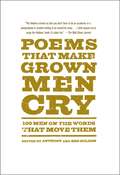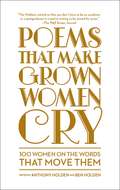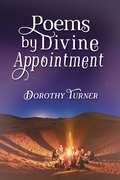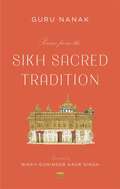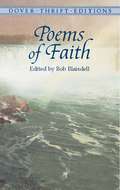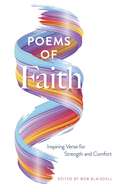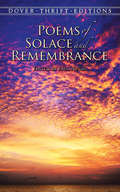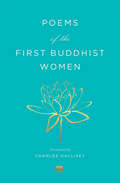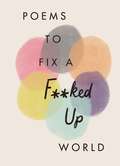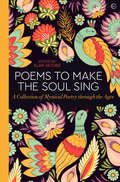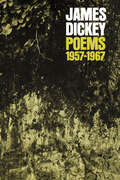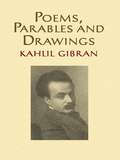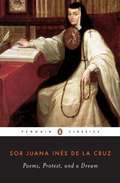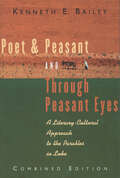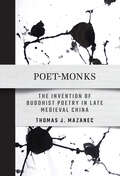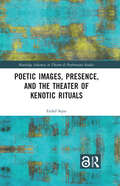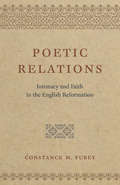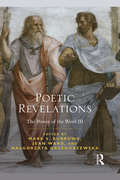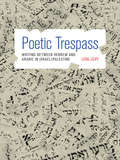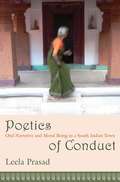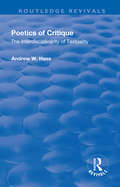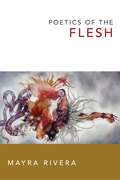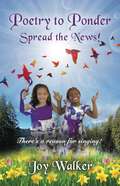- Table View
- List View
Poems That Make Grown Men Cry: 100 Men on the Words That Move Them
by Anthony Holden Ben HoldenGrown men don't cry. But in this fascinating anthology, one hundred men--distinguished in literature and film, science and architecture, theater and human rights--confess to being moved to tears by poems that continue to haunt them. Representing twenty nationalities and ranging in age from their early 20s to their late 80s, the majority are public figures not prone to crying. Here they admit to breaking down when ambushed by great art, often in words as powerful as the poems themselves. Their selections include classics by visionaries such as Walt Whitman, W.H Auden, and Philip Larkin, as well as contemporary works by masters including Billy Collins, Seamus Heaney, Derek Walcott, and poets who span the globe from Pablo Neruda to Rabindranath Tagore. Seventy-five percent of the selected poems were written in the twentieth century, with more than a dozen by women including Mary Oliver, Elizabeth Bishop, and Gwendolyn Brooks. Their themes range from love in its many guises, through mortality and loss, to the beauty and variety of nature. Three men have suffered the pain of losing a child; others are moved to tears by the exquisite way a poet captures, in Alexander Pope's famous phrase, "what oft was thought, but ne'er so well express'd. From J. J. Abrams to John le Carré, Salman Rushdie to Jonathan Franzen, Daniel Radcliffe to Nick Cave, Billy Collins to Stephen Fry, Stanley Tucci to Colin Firth, and Seamus Heaney to Christopher Hitchens, this collection delivers private insight into the souls of men whose writing, acting, and thinking are admired around the world.
Poems That Make Grown Women Cry: 100 Women on the Words that Move Them
by Anthony Holden Ben HoldenThe internationally bestselling collection of poetry so powerful that it has moved readers to tears. “Anthony and Ben Holden remind us that you don’t have to be an academic or a postgraduate in creative writing to be moved by verse” (The Wall Street Journal).One hundred women—distinguished in literature and film, science and law, theater and human rights—share poems that have stayed with them long after reading. The poems here range from the eighth century to today, from Rumi and Shakespeare to Sylvia Plath, W.H. Auden to Carol Ann Duffy, Pablo Neruda, and Derek Walcott to Imtiaz Dharker and Warsan Shire. Their themes range from love and loss, through mortality and mystery, war and peace, to the beauty and variety of nature. From Yoko Ono to Judi Dench, Chimamanda Ngozi Adichie to Elena Ferrante, Tina Brown, Michelle Williams, and Sarah Waters to Kaui Hart Hemmings and Joan Baez to Nikki Giovanni, this unique collection delivers private insights into the minds of women whose writing, acting, and thinking are admired around the world. Their selections include classics by visionaries, such as Emily Dickinson, Walt Whitman, and Pablo Neruda as well as contemporary works by masters, including Seamus Heaney, Adrienne Rich, and Warsan Shire, with introductions to their work as powerful as the poems themselves. Poems That Make Grown Women Cry is a collection which represents a variety of aesthetic sensibilities and the full spectrum of human emotion. It is also a reminder of how poetry can touch minds and hearts, and how easily it will do so for readers of all stripes if they turn the first page.
Poems by Divine Appointment
by Dorothy TurnerPoems by Divine Appointment are poems with purpose. They were written to inspire and to stir up your spirit. You will find some of these poems are quite long while others are very short. Nevertheless, each poem has a message that&’s clear and get straight to the point leaving nothing to the imagination. These poems are power packed, and I hope every reader will experience the presence of God through reading these poems. Yes, Poems by Divine Appointment are mine, but they came from God&’s creative mind. Now allow me to give you a little peek inside of the book with this poem. What&’s In the SeaI&’ve seen deep in the sea,Things we are about to see.There are a lot of things in the sea,But it&’s nothing that I can&’t see.Fishermen are on the seaTrying to catch what they can&’t see.The birds of the air; the fish of the seaWill make do with what they see.Don&’t be disturbed by what you see,It&’s just the beginning of what it&’s going to be.I&’ve seen deep in the sea,Trouble stirring in the sea. Memphis, TennesseeWill soon be nothing to see.Things are stirring up in the sea,Things you are about to see.When I looked across the sea,I saw things I didn&’t want to see.I&’ve been fishing in the seaTo catch what the fishermen couldn&’t see.Who made the sea?The one you cannot see.I&’ve seen deep in the sea,Things that&’s about to be.Memphis, TennesseeIs about to be nothing to see.
Poems from the Sikh Sacred Tradition (Murty Classical Library of India #33)
by Guru Nanak“A landmark volume, filled with beautiful renderings of writings from the Guru Granth Sahib.”—Simran Jeet Singh, author of The Light We Give: How Sikh Wisdom Can Transform Your LifeAn exquisite new translation of Guru Nanak’s verses, illuminating the sacred tenets cherished by millions of Sikhs worldwide.Guru Nanak (1469–1539), a native of Panjab, founded the Sikh religion. His vast corpus of nearly a thousand hymns forms the core of the Guru Granth Sahib, the Sikhs’ sacred book of ethics, philosophy, and theology. The scripture was expanded and enriched by his nine successors, and Sikhs continue to revere it today as the embodiment of their tradition.This beautiful new translation by Nikky-Guninder Kaur Singh, a foremost authority on Sikhism, offers a selection of spiritual lyrics composed by Guru Nanak. Here the reader will find the range and depth of his pluralistic vision of the singular divine and discover his central values of equality, inclusivity, and civic action—values that continue to shape the lives of Sikhs worldwide.
Poems of Faith
by Bob BlaisdellThe best-known works of more than 60 British and American poets, written over a period of nearly 400 years, comprise this superb collection of verse. Focusing on poems of faith -- inspiring, comforting, and profound works with religious themes and ideals -- the volume includes "Holy Sonnets" by John Donne, Ben Jonson's "To the Holy Trinity," "Paradise" by George Herbert, "On His Blindness" by John Milton, as well as poems by Andrew Marvell, Thomas Traherne, Edward Taylor, Samuel Johnson, William Cowper, William Blake, Emily Bronte, Christina Rossetti, Emily Dickinson, Gerard Manley Hopkins, and many others. A rich treasury of stirring verse, this collection is ideal for classroom use or for independent study but will also appeal to lovers of exceptional English and American poetry. Dover original selection of poems from standard editions.
Poems of Faith: Inspiring Verse for Strength and Comfort
by DoverPoetry has long been a source of comfort and inspiration in times of struggle and celebration, and this carefully curated selection of nearly 100 American and British poems offers readers a profound collection of verse for those who are steadfast in their faith or those who are looking to renew it. This beautiful gift edition includes two of John Donne's "Holy Sonnets," Ben Jonson's "To the Holy Trinity," Christina Rosetti's "Wrestling," Emily Brontë's "Last Lines," and other poems by Andrew Marvell, Gerard Manley Hopkins, William Blake, Emily Dickinson, Elizabeth Barrett Browning, and more.
Poems of Solace and Remembrance (Dover Thrift Editions: Poetry Ser.)
by Paul NegriThis memorable collection, designed to offer comfort and inspiration to the bereaved, contains about 90 poems including the 23rd Psalm, "Death Be Not Proud," "Crossing the Bar," "Because I Could Not Stop for Death," "Do Not Go Gentle into That Good Night," plus works by Shakespeare, Shelley, Wordsworth, Longfellow, Browning, Whitman, Swinburne, Kipling, Frost, and Auden. Includes a selection from the Common Core State Standards Initiative: "Because I Could Not Stop for Death."
Poems of the First Buddhist Women: A Translation of the Therigatha (Murty Classical Library Of India - Hup Ser. #3)
by Charles HalliseyThe Therīgāthā is one of the oldest surviving literatures by women, composed more than two millennia ago and originally collected as part of the Pali canon of Buddhist scripture. These poems were written by some of the first Buddhist women—therīs—honored for their religious achievements. Through imaginative verses about truth and freedom, the women recount their lives before ordination and their joy at attaining liberation from samsara. Poems of the First Buddhist Women offers startling insights into the experiences of women in ancient times that continue to resonate with modern readers. With a spare and elegant style, this powerful translation introduces us to a classic of world literature.
Poems to Fix a F**ked Up World
by Various PoetsSometimes it's hard to keep looking up at the stars when the gutter we're in seems so full of sh*t. But isn't that why we need poetry? Oscar Wilde wrote some of his best poetry when he was in prison for 'the love that dare not speak its name'. Nelson Mandela held fast to his 'unconquerable soul' on Robben Island with the help of the words a poet wrote about his battle with tuberculosis a century before. So maybe it's not inconceivable that the words in this little book could help you put some of the sh*t in perspective, get all the important bits of your life - like sleep, work, food, travel, love and learning - in some kind of balance, so you can go back to star-gazing again . . . Taking as its starting point the classic 'wheel of balance' life-coach model, this beautifully packaged collection of extracts and short poems gathers wisdom old and new in a perfect gift for anyone who needs comfort in this f**ked up world of ours.'This is not a poetry book as you know it, this is a life raft.' Emerald Street on Poems for a World Gone to Sh*t.
Poems to Make the Soul Sing: A Collection of Mystical Poetry through the Ages
by Alan JacobA beautifully designed collection of mystical poems to soothe, inspire and rejuvenate the soul. With a body of work spanning the centuries, from the Vedas to St Teresa of Avila, Rumi and Rilke, and arranged by transcendent themes, this book will connect readers with nature, with the stillness within themselves and with the Divine. When your soul hungers for peace, knowledge or comfort, there is no answer as profound as poetry. In a world that is increasingly noisy and disconnected from the Divine, this wonderfully inspiring collection of poems for the soul from mystics of all traditions encourages readers to listen to their own hearts, marvel at the wonder of nature and explore profound truths of life, death, eternity and God. With its elegant design and comprehensive selection of poets, the volume is ideal for gifting. Themed chapters allow readers to choose topics to explore, including: DIVINITY – what is the nature of God or the One? TRANSCENDENCE – what deep truths can we find in our spiritual quest? LOVE – how can we give and cherish most profoundly? DEVOTION – how should we explore and affirm our faith? PEACE – how can we find stillness amidst turmoil and loss? NATURE – what lessons can we learn from creation? SPIRIT – what is sacred about the individual self? From the Bhagavad Gita, the Vedas and the Song of Solomon to the Divine Comedy and the Rubaiyat of Mar Khayyam, readers will find all the great mystical writers, including Attar, Ansari, St Francis of Assisi, Lao Tzu, John Donne, John Bunyan, Gerard Manley Hopkins, Elizabeth Barratt Browning, Christine Rossetti and Walt Whitman, as well as many fine but lesser-known spiritual writers. A book to give as a thoughtful gift, and also one to treasure.
Poems, 1957–1967: 1957-1967 (Wesleyan Poetry Series)
by James DickeyClassic poems from a famous American poet This volume represents, under one cover, the major work of the man whom critics and readers have designated the authentic poet of his American generation. For this collection, James Dickey has selected from his four published books all those poems that reflect his truest interests and his growth as an artist. He has added more than a score of new poems—in effect, a new book in themselves—that have not previously been published in volume form. Specifically, Poems 1957-1967 contains 15 of the 24 poems that were included in his first book, Into the Stone (1960); 25 of the 36 that made up Drowning With Others (1962); 22 of the 24 in Helmets (1964); the entire 22 in the National Book Award winner Buckdancer's Choice (1965); and, under the titles Sermon and Falling, the exciting new poems mentioned above. Seldom can the word "great" be used of the work of a contemporary in any art. But surely it applies to the poems of James Dickey.
Poems, Parables and Drawings
by Kahlil Gibran Alice RaphaelThe perfect companion to Kahlil Gibran's classic, The Prophet, this elegant volume presents an original selection of works by the popular writer and artist. It consists of the complete texts and drawings of The Madman and The Forerunner, plus 20 additional illustrations--many long out of print--and a perceptive essay by art historian Alice Raphael. The Madman features a series of concise stories and verses offering uplifting views of human nature. Gibran warmly encourages his readers to abandon the superficial and embrace the true self, an outlook that recurs in The Forerunner and its 24 morality tales. Each of the poems, parables, and illustrations reflects Gibran's fervent belief in the transformative powers of love. This splendid keepsake edition of the renowned author's influential works is an ideal gift for any occasion.
Poems, Protest, and a Dream
by Margaret Sayers Peden Sor Juana Ines de la CruzSor Juana Ines de la Cruz (1648-1695) wrote her most famous prose work, La Respuesta a Sor Filotea, in 1691 in response to her bishop's injunction against her intellectual pursuits. A passionate and subversive defense of the rights of women to study, to teach, and to write, it predates by almost a century and a half serious writings on any continent about the position and education of women. Moreover, notes Ilan Stavans in his introduction, it has become "a cornerstone of Hispanic-American identity ... at once a chronicle of the tense gender relations in the Western Hemisphere, a rich portrait of the social behavior that prevailed more than a century before independence from Spain was gained in 1810, and the very first intellectual autobiography written by a criolla in a hemisphere known for its solipsism, introversion, and allergy to public confessions. Also included in this wide-ranging selection is a new translation of Sor Juana's masterpiece, the epistemological poem "Primero Sueno, " as well as revealing autobiographical sonnets, reverential religious poetry, secular love poems (which have excited speculation through three centuries), playful verses, and lyrical tributes to New World culture that are among the earliest writings celebrating the people and the customs of this hemisphere.
Poesía sobre mujeres inspiradoras – Libro VII
by D. S. PaisAl escribir este libro, he tenido muy presente el viaje vital de grandes mujeres que han causado un impacto en el mundo, y lo han cambiado a mejor. Como tributo a estas ilustres mujeres, he dado con lo mejor de mí un paso adelante en la forma de poesía, alabándolas por desafiar las circunstancias alrededor suyo. Mi objetivo es iluminar e inspirar . Incluso las mas excelentes personas enfrentan desafíos, pero los dejan atrás y hacen que se oigan sus voces. He homenajeado a las siguientes mujeres en este libro: Emperatriz Dowager Cixi, Andrea Dworkin, y, Wilma Rudolph
Poet & Peasant and Through Peasant Eyes: A Literary-Cultural Approach to the Parables in Luke
by Kenneth E. BaileyThis volume is a combined edition of Poet and Peasant and Through Peasant Eyes, Kenneth Bailey's intensive studies of the parables in the gospel of Luke. Bailey begins by surveying the development of allegorical, historical-eschatological, aesthetic, and existential methods of interpretation. Though figures like Julicher, Jeremias, Dodd, Jones, and Via have made important advances, Bailey sees the need to go beyond them by combining an examination of the poetic structures of the parables with a better understanding of the Oriental culture that informs the text. Bailey's work within Middle Eastern peasant culture over the last twenty years has helped him in his attempt to determine the cultural assumptions that the teller of the parables must have made about his audience. The same values which underlay the impact of the parables in Christ's time, Bailey suggests, can be discovered today in isolated peasant communities in Egypt, Lebanon, Syria, and Iraq. Because time has made almost no impact in these cultural pockets, it is possible to discern, for example, what it meant 2,000 years ago for a friend to come calling at midnight, or for a son to ask for his inheritance prior to his father's death. In addition to illuminating the cultural framework of the parables, Bailey offers an analysis of their literary structure, treating the parabolic section as a whole as well as its individual components. Through its combination of literary and cultural analyses, Bailey's study makes a number of profound advances in parabolic interpretation.
Poet-Monks: The Invention of Buddhist Poetry in Late Medieval China
by Thomas J. MazanecPoet-Monks focuses on the literary and religious practices of Buddhist poet-monks in Tang-dynasty China to propose an alternative historical arc of medieval Chinese poetry. Combining large-scale quantitative analysis with close readings of important literary texts, Thomas J. Mazanec describes how Buddhist poet-monks, who first appeared in the latter half of Tang-dynasty China, asserted a bold new vision of poetry that proclaimed the union of classical verse with Buddhist practices of repetition, incantation, and meditation.Mazanec traces the historical development of the poet-monk as a distinct actor in the Chinese literary world, arguing for the importance of religious practice in medieval literature. As they witnessed the collapse of the world around them, these monks wove together the frayed threads of their traditions to establish an elite-style Chinese Buddhist poetry. Poet-Monks shows that during the transformative period of the Tang-Song transition, Buddhist monks were at the forefront of poetic innovation.
Poetic Ethics in Proverbs
by Anne W. StewartThe Book of Proverbs' frequent use of binary oppositions - righteous and wicked, wise and foolish - has led many to assume that its vision of the moral world is relatively simplistic. This study demonstrates that Proverbs in fact presents a remarkably sophisticated response to ethical questions of profound concern to the Israelite sages who crafted the book: what motivates human beings? How do they learn? How does the power of desire shape human characters? Anne W. Stewart analyzes Proverbs' multifaceted collection of images and metaphors to reveal their complex understanding of the development of the moral self, which suggests that character formation requires educating all of the senses and not simply the cognitive faculties. One of few works to make explicit connections between the poetic form of Proverbs and its pedagogical function, Poetic Ethics in Proverbs will appeal to all those interested in literary approaches to the Bible.
Poetic Images, Presence, and the Theater of Kenotic Rituals (Routledge Advances in Theatre & Performance Studies)
by Eniko SepsiThis book explores the interrelation of contemporary French theatre and poetry. Using the pictorial turn in the various branches of art and science, its observable features, and the theoretical framework of the conceptual metaphor, this study seeks to gather together the divergent manners in which French poetry and theatre address this turn. Poetry in space and theatricality of poetry are studied alongside theatre, especially to the performative aspect of the originally theological concept of "kenosis". In doing so the author attempts to make use of the theological concept of kenosis, of central importance in Novarina’s oeuvre, for theatrical and dramatological purposes. Within poetic rituals, kenotic rituals are also examined in the book in a few theatrical practices – János Pilinszky and Robert Wilson, Jerzy Grotowski and Eugenio Barba – facilitating a better understanding of Novarina’s works. Accompanied by new English translations in the appendices, this is the first English language monograph related to the French essayist, dramaturg and director Valère Novarina’s theatre, and will be of great interest to students and scholars in theatre and literature studies.
Poetic Relations: Intimacy and Faith in the English Reformation
by Constance M. FureyWhat is the relationship between our isolated and our social selves, between aloneness and interconnection? Constance M. Furey probes this question through a suggestive literary tradition: early Protestant poems in which a single speaker describes a solitary search for God. As Furey demonstrates, John Donne, George Herbert, Anne Bradstreet, and others describe inner lives that are surprisingly crowded, teeming with human as well as divine companions. The same early modern writers who bequeathed to us the modern distinction between self and society reveal here a different way of thinking about selfhood altogether. For them, she argues, the self is neither alone nor universally connected, but is forever interactive and dynamically constituted by specific relationships. By means of an analysis equally attentive to theological ideas, social conventions, and poetic form, Furey reveals how poets who understand introspection as a relational act, and poetry itself as a form ideally suited to crafting a relational self, offer us new ways of thinking about selfhood today—and a resource for reimagining both secular and religious ways of being in the world.
Poetic Revelations: Word Made Flesh Made Word: The Power of the Word III (The Power of the Word)
by Mark S. Burrows Jean Ward Małgorzata GrzegorzewskaThis book explores the much debated relation of language and bodily experience (i.e. the 'flesh'), considering in particular how poetry functions as revelatory discourse and thus relates to the formal horizon of theological inquiry. The central thematic focus is around a 'phenomenology of the flesh' as that which connects us with the world, being the site of perception and feeling, joy and suffering, and of life itself in all its vulnerability. <P><P> The voices represented in this collection reflect interdisciplinary methods of interpretation and broadly ecumenical sensibilities, focusing attention on such matters as the revelatory nature of language in general and poetic language in particular, the function of poetry in society, the question of Incarnation and its relation to language and the poetic arts, the kenosis of the Word, and human embodiment in relation to the word 'enfleshed' in poetry.
Poetic Trespass
by Lital LevyA Palestinian-Israeli poet declares a new state whose language, "Homelandic," is a combination of Arabic and Hebrew. A Jewish-Israeli author imagines a "language plague" that infects young Hebrew speakers with old world accents, and sends the narrator in search of his Arabic heritage. In Poetic Trespass, Lital Levy brings together such startling visions to offer the first in-depth study of the relationship between Hebrew and Arabic in the literature and culture of Israel/Palestine. More than that, she presents a captivating portrait of the literary imagination's power to transgress political boundaries and transform ideas about language and belonging. Blending history and literature, Poetic Trespass traces the interwoven life of Arabic and Hebrew in Israel/Palestine from the turn of the twentieth century to the present, exposing the two languages' intimate entanglements in contemporary works of prose, poetry, film, and visual art by both Palestinian and Jewish citizens of Israel. In a context where intense political and social pressures work to identify Jews with Hebrew and Palestinians with Arabic, Levy finds writers who have boldly crossed over this divide to create literature in the language of their "other," as well as writers who bring the two languages into dialogue to rewrite them from within. Exploring such acts of poetic trespass, Levy introduces new readings of canonical and lesser-known authors, including Emile Habiby, Hayyim Nahman Bialik, Anton Shammas, Saul Tchernichowsky, Samir Naqqash, Ronit Matalon, Salman Masalha, A. B. Yehoshua, and Almog Behar. By revealing uncommon visions of what it means to write in Arabic and Hebrew, Poetic Trespass will change the way we understand literature and culture in the shadow of the Israeli-Palestinian conflict.Some images inside the book are unavailable due to digital copyright restrictions.
Poetics of Conduct: Oral Narrative and Moral Being in a South Indian Town
by Leela PrasadLeela Prasad's riveting book presents everyday stories on subjects such as deities, ascetics, cats, and cooking along with stylized, publicly delivered ethical discourse, and shows that the study of oral narrative and performance is essential to ethical inquiry. Prasad builds on more than a decade of her ethnographic research in the famous Hindu pilgrimage town of Sringeri, Karnataka, in southwestern India, where for centuries a vibrant local culture has flourished alongside a tradition of monastic authority. Oral narratives and the seeing-and-doing orientations that are part of everyday life compel the question: How do individuals imagine the normative, and negotiate and express it, when normative sources are many and diverging? Moral persuasiveness, Prasad suggests, is intimately tied to the aesthetics of narration, and imagination plays a vital role in shaping how people create, refute, or relate to "text," "moral authority," and "community." Lived understandings of ethics keep notions of text and practice in flux and raise questions about the constitution of "theory" itself. Prasad's innovative use of ethnography, poetics, philosophy of language, and narrative and performance studies demonstrates how the moral self, with a capacity for artistic expression, is dynamic and gendered, with a historical presence and a political agency.
Poetics of Critique: The Interdisciplinarity of Textuality (Routledge Revivals Ser.)
by Andrew W. HassTitle first published in 2003. Poetics of Critique breaks new ground in its pursuit of a formal and critical language of interdisciplinarity. The "founding" disciplines within the humanities - theology, philosophy, and literature - are brought together here in a shared space, but one that reconstitutes the very nature of each and any discipline. Readings alternate between discursive analysis and imaginative revisioning; texts alternate between those of the critical thinker (Kant, Nietzsche, Gadamer) and those of the novelist, the poet, and the playwright (Bulgakov, Goethe, Kundera, Sophocles). In this movement between traditions, a fusion, at once organic and dynamic, takes place: theologian, philosopher and artist become one, and a pure interdisciplinarity begins to emerge into view. Andrew Hass draws us into a new critical-poetic sensibility, by which we may explore the ultimate questions of human existence and divine reality with new vigor and sustain, or indeed revitalize, our deep passion for the fundamental question of truth.
Poetics of the Flesh
by Mayra RiveraIn Poetics of the Flesh Mayra Rivera offers poetic reflections on how we understand our carnal relationship to the world, at once spiritual, organic, and social. She connects conversations about corporeality in theology, political theory, and continental philosophy to show the relationship between the ways ancient Christian thinkers and modern Western philosophers conceive of the "body" and "flesh." Her readings of the biblical writings of John and Paul as well as the work of Tertullian illustrate how Christian ideas of flesh influenced the works of Maurice Merleau-Ponty and Michel Foucault, and inform her readings of Judith Butler, Frantz Fanon, and others. Rivera also furthers developments in new materialism by exploring the intersections among bodies, material elements, social arrangements, and discourses through body and flesh. By painting a complex picture of bodies, and by developing an account of how the social materializes in flesh, Rivera provides a new way to understand gender and race.
Poetry To Ponder: Spread The News! - There's A Reason For Singing
by Joy WalkerThis retelling of the Christmas story, through poetry and biblical references, inspires thoughtful meditation and joyful singing. Several poems can be sung to the tune of well-known Christmas carols and other songs. Reflections on the reason for Jesus’ birth remind us that we can still have hope for our broken world. The opening theme is the birth of Jesus, a miraculous display of God’s love for us celebrated at Christmas. However, Christmas is only the beginning. What follows His birth is even more astounding and life-transforming. The first part of the book resounds with joy and celebration at this phenomenal love-gift sent to us by a holy and loving God seeking to reconnect with his lost sheep. The celebration is not just because of His birth, but because He was born to die for mankind’s redemption from sin’s bondage. What is more praiseworthy is His resurrection, the foundation of the Christian faith. Because Jesus is alive, His power and light will always outshine the darkness. This is clearly a reason for singing. With the life of Jesus as our example, the remaining poems cover various aspects of Christian living: forgiveness, righteousness, justice, compassion for our neighbor and resisting temptation. Some poems cover controversial issues like the sanctity of life and the sanctity of marriage. They remind us that we are in a spiritual battle and must daily make choices between good and evil. We are exhorted to love God and obey His precepts in order to flourish. Loving and caring for each other are some of the daily choices we must make. Without that, our human society sinks into chaos. While the explosion of evil around us is frightening, we also struggle with our own personal weaknesses and failures and need reminders that Jesus will meet us in those struggles. Several of the poems are prayers from a burdened heart wrestling with the enticement of sin and the need to receive or grant forgiveness. Some are the expressions of grief and pain in moments of despair so common to mankind. Other poems are songs of praise and thanksgiving for God’s faithfulness in delivering from trials of various kinds. The book ends with poems of victory in anticipation of Jesus’ triumphant return to fulfill His promise to abolish sin and suffering. It is a time of rejoicing for those who love Him, but a time of fear and trembling for those who do not. The goal of this book is to point people to the God who sees all and who does not desire anyone to perish. His mercy is extended to all who would receive it. The biblical references that follow the poems will challenge the reader to a deeper dive into the very words of God to glean strength, wisdom and courage for daily living. These poems are meant to serve as a springboard to that end, and there is something here for everyone and for every season.
